Our business depends on responsible stewardship of nature, the source of our produce that will sustain our future.
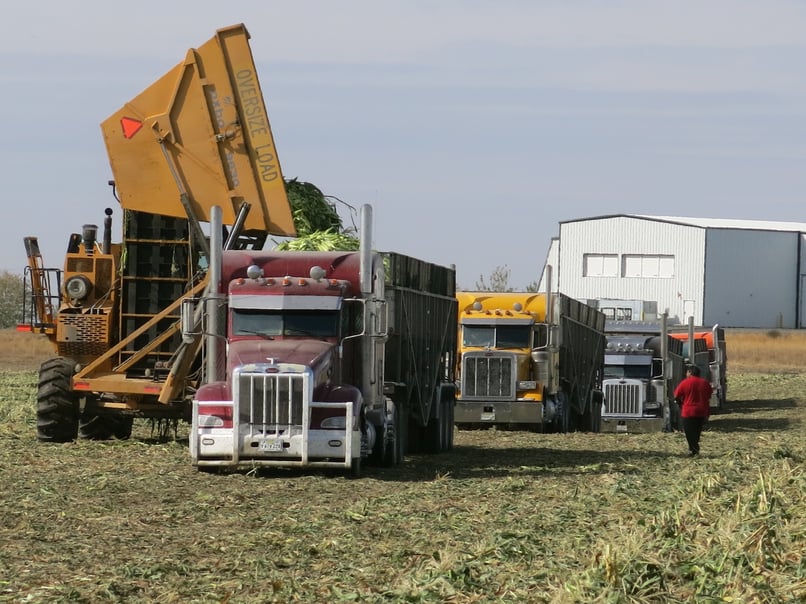
Corn harvest in the US
As a food company, our produce relies on responsible stewardship of nature to sustain our future. We continuously improve our agricultural practices and oversight of growers, and communicate our Environmental Policy to our stakeholders.
Del Monte’s close-to-a-century of growing and manufacturing in the Philippines and more than a hundred years of operations in the U.S., attest to how the Group has sustained its operations. As climate change shifts environmental patterns, the Group makes its business more resilient through investment in sustainable agriculture which DMPL is committed to.
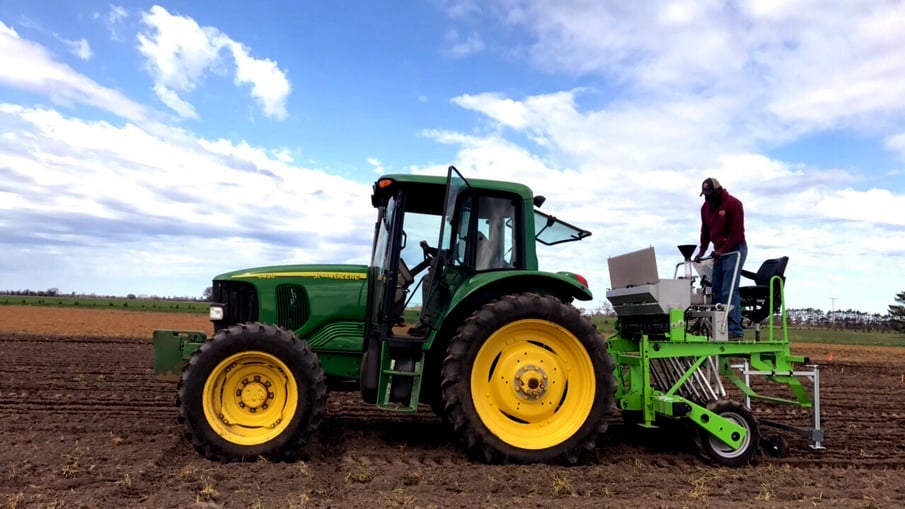 Tomato transplanting in the US
Tomato transplanting in the US
Access to adequate food is part of human rights and should be available for everyone to enjoy. Del Monte commits to provide consumers sustainable, safe and nutritious food products across a wide variety of price points and value. The Group recognizes the importance of implementing sustainable agricultural and manufacturing practices to ensure the adequacy of food supply.
Food security has become a global issue. This has been exacerbated by challenges in farming such as climate change, production inefficiencies, harvest activities, supply chain and distribution, among others. If not mitigated, these challenges will result in decreased farm yields, increased food loss, and higher prices for food products.
The Group implements measures to mitigate risks and challenges and ensures availability and accessibility of nutritious food.
1. Del Monte Foods, Inc.’s (DMFI) Research and Development team develops new seed varieties that improve yields, reduce water usage and reliance on fertilizer and pesticides.
2. 90% of green beans and 30% of corn come from seeds developed by DMFI through its seed breeding program.
3. New seed breeding lines are tested every year on pilot plots for product quality, yield, nutrient content, machine harvestability, drought, pests and disease resistance. Approved varieties are added to the Del Monte Foods Approved Variety List for use by any of its growers.
4. Del Monte in the U.S. works with growers and the Stewardship Index of Specialty Crops (SISC) to implement sustainable farming practices and ensure stable crop yields.
5. DMFI is also an Executive Board Member of the Canned Food Alliance which promotes many benefits of canned foods, including nutrition, convenience, affordability, year-round availability, and sustainability.
6. Del Monte Philippines’ land use practices have been focused on improving plantation yield through ecologically friendly land preparation, use of sustainable planting materials, plant nutrient application, water source and plant disease management.
7. Del Monte in the Philippines obtained the Rainforest Alliance certificate for its fresh pineapple and juicing plant, recognizing that its plantation complies with standards and demonstrates the company's commitment to responsible stewardship of the environment, occupational health, safety and work conditions of employees, and development of communities near the plantation and facilities.
8. DMPI is certified GLOBALG.A.P., PhilGAP-Plantation and PhilGAP – Outgrowership. The certification includes Environment Management System (Site Management, Soil Management, Fertilizer Application Management, Water Management, Integrated Pest Management and Plant Protection Products Management), Food Safety, Quality Management System, and Workers Occupational Health and Safety.
Certification audits, including environmental audits, are conducted on a periodic basis to ensure the Company complies with certification standards.
9. DMPI complies with environmental regulations and requirements of the Department of Environment and Natural Resources (DENR) with respect to the Clean Air Act, Clean Water Act, and Solid and Hazardous Waste Management.
10. DMPI’s Internal Audit covers environmental compliance as part of its annual audit plan.
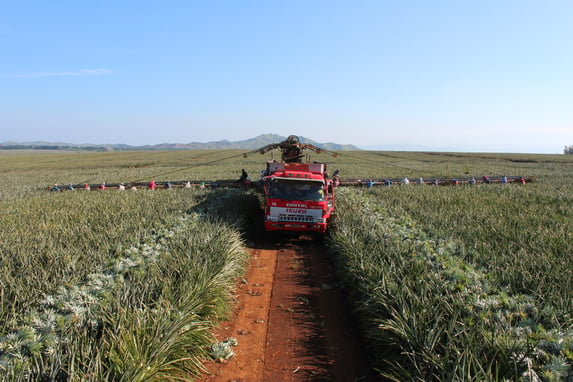
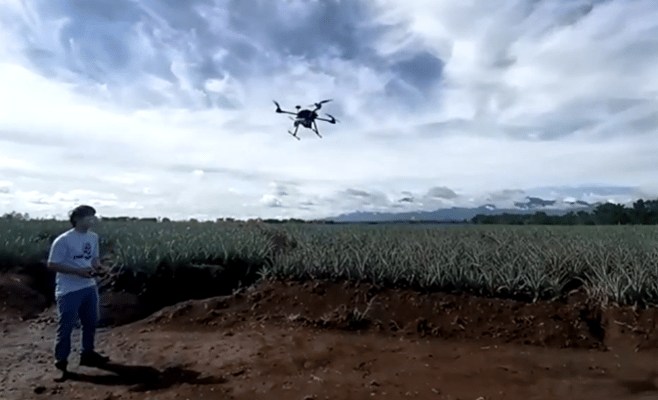
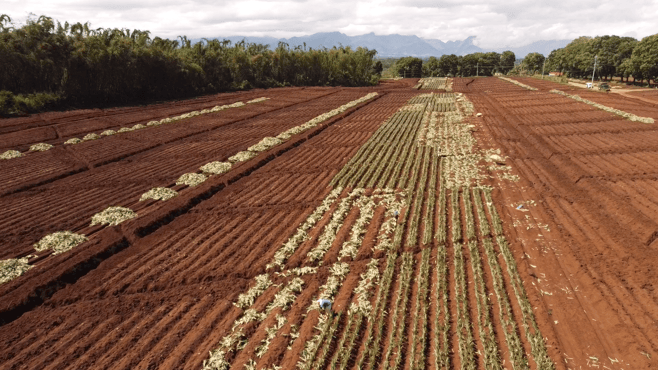
Efficient and ecological land use management is foundational to the sustainable agricultural practices of Del Monte Philippines, Inc. (DMPI) which started nearly a century ago in 1926.
DMPI’s farming pioneers did not clear forests to establish pineapple fields. Additional land later acquired was cultivated with other crops.
Due diligence is conducted.
1. In securing additional lands, the Company identifies potential land based on available data, such as distance from Cannery or Packing House, elevation and land suitability – soil pH, slope, land area, among others.2. DMPI conducts a validation on the potential areas identified and, if suitable, appropriate permits and endorsements are then secured from the concerned government agencies and local government units.
3. Part of the due diligence involves validating ownership by cross checking with the Department of Natural Resources, Department of Agrarian Reform and Land Registration Authority before contracting.
4. Most of the lands the Company leases are either grasslands or planted agricultural lands. During the development of the area, non-arable lands serve as the habitat for flora and fauna.
The Company also implements tree planting activities using a variety of trees and shrubs on some areas across the Plantation. Buffer zones are also observed from water bodies, populated areas and adjacent farms.
5. A team from the Company conducts a project presentation to the communities of the target expansion areas and identifies any concerns which Del Monte addresses accordingly.
6. When engaging suitable lands of Indigenous Peoples (IP) or Ancestral Domain lands for pineapple production, Del Monte secures a Free Prior and Informed Consent of the IP community to contract the ancestral land under the regulatory process of the National Commission of Indigenous Peoples (NCIP).
Through consultations with the IP community and the guidance of the NCIP, Memorandum of Agreements are made, which outlines the roles, responsibilities and accountabilities of the Company, the IP community, and NCIP.
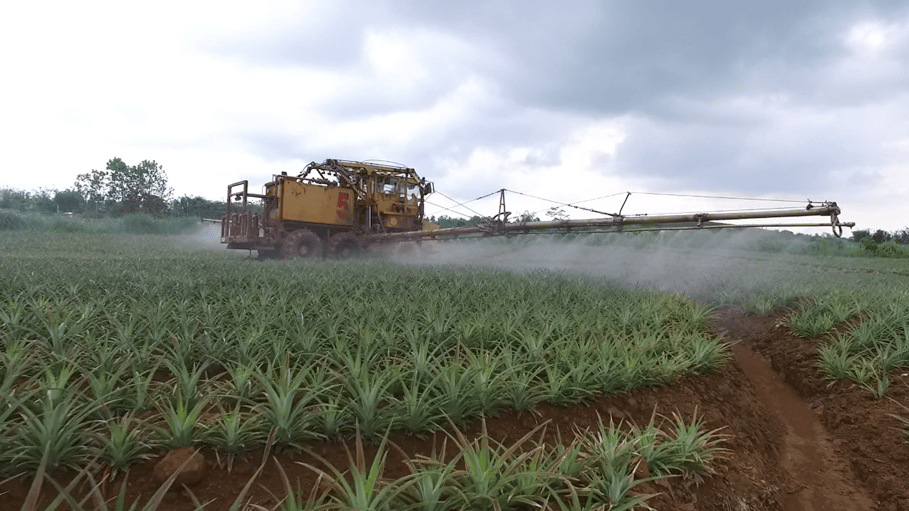
As efficient management of soil directly impacts our long-term productivity, we focus on regenerating topsoil and improving biodiversity on and below the ground.
1. DMFI proactively works closely with growers on sustainability initiatives and encourages farmers to work with qualified agronomists to innovate farm practices and technologies to boost crop yields, control pests and weeds, and protect the environment.
2. DMFI growers regenerate topsoil by rotating crops, using cover crops and applying organic compost. Growing cover crops in the off-season reduces soil erosion and retains soil nutrients.
More than 50 percent of our growers use cover crops.
3. In the Philippines, DMPI is working on a soil conservation project to maintain land productivity, mitigate topsoil loss, prevent soil erosion and reduce loss of soil nutrients.
4. The Company plants cover crops as ground covers along main road shoulders before the boundary canal and maintains the grass levels on side slopes of permanent waterways to prevent erosion after heavy rains.
The Crop Growing Units use drone images to dredge ditches, install auxiliary canals and silting basins for each field, and plants along river easement near pineapple fields to prevent soil erosion.
5. DMPI’s Drone Program displays the land topography and monitors the pineapple field in Bukidnon and Misamis Oriental. Drone sensors produce a complete image of a field when planting is completed. Seeds take root and show growth within 2-3 months after planting.
6. The Company has a soil map used by our Agricultural Research Laboratory to regularly analyze soil nutrients except nitrogen and organic matter.
7. DMPI uses Meteoblue high-resolution weather data to measure the five-day and fourteen-day rainfall on location-specific, daily and hourly resolution forecast in each field.
8. For Del Monte in the U.S., understanding and analyzing the agronomics of a new variety is important for environmental adaptation.
9. DMPI conducted a thorough review of its Soil Conservation manual and revision was made on canal geometries and water velocities.
10. DMPI uses a soil and water assessment tool program to monitor the health status of its resources.
11. The Geomatics team uses near-infrared spectroscopy to detect changes in internal maturity and translucency in fresh fruits using a non-destructive inspection.
12. The team has implemented a new workflow for detecting field depression for quality of land preparation after the 2nd pass chopping. By processing topography drone flight data following a specialized workflow, it enables the early detection of possible waterlogging in fields even before planting takes place.
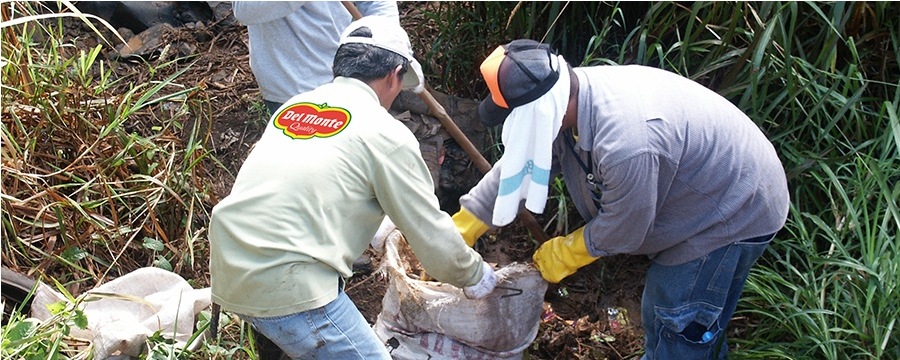
Clean-up drive in the plantation
Water is one of Del Monte’s impact areas with respect to growing and packing operations but access to it is threatened by climate change.
The Group implements the least water-intensive cultivation methods available and encourages the use of more water-efficient irrigation systems. DMPL follows strict protocols around our well water use and sprays discharge for the water used in our manufacturing process.
1. The Company proactively manages water use through efficiency measures, including selecting drought-resistant seeds, promoting drip irrigation and recycling water used in production in our cooling towers. We discharge used and treated water into spray fields, where it can re-enter and recharge groundwater stores and local streams.
2. All DMFI growers in central Washington State use center pivot irrigation so they are able to control their water use using only as much or as little as needed to grow their crops with no waste.
3. Three manufacturing facilities of DMFI operate in areas where the baseline water stress is 80% which is considered extremely high. These are our Hanford and Modesto facilities in California and Puebla plant in Mexico.
4. Over 98% of the Company’s tomato growers in California utilize drip irrigation to manage water resources more efficiently, especially in drought-prone areas in the western United States.
5. At one of our sites in Yakima, Washington, DMFI installed a water recycling system that reuses the water that conveys its pears, resulting in water usage reduction of about 3,800 liters (1,000 gallons) per day.
6. Del Monte Foods created a task force to identify and implement ways to reduce water use at our high water-risk areas.
7. Much of the water that is used to cool cans is recycled in our system. DMFI sources water from municipal sources and its own wells.
8. DMFI recycles the cooling water from its cans to run our cooling towers and reduce fresh water and energy usage.
10. The cannery and bottling plant operations in the Philippines monitor the Water Use Ratio (WUR), i.e. liters of water used per common case. DMPI’s facilities WUR is 12% lower compared to the previous year, while the plantation operations WUR increased by 2% in liters per farm hectare due to more growing fields.
11. DMPI toll manufacturers’ water conservation programs eliminate waste and reduce water consumption. Wastewater discharges of all toll manufacturing lines are within regulatory standards. WUR in beverage and culinary toll manufacturers are monitored and reduced each year.
We help growers apply the principles of Integrated Pest Management (IPM) to minimize pesticides.
Del Monte Foods, Inc. (DMFI) connects our growers and consumers through partnership with the Stewardship Index of Specialty Crops organization and CropTrak™ for their crop data management system, providing detailed information on how vegetables are grown.
1. In the U.S., CropTrak™ monitors cover crops, which help increase organic matter, reduce wind and soil erosion, sequester carbon, filter water, control weeds, and manage nutrients.
2. DMFI optimizes fertilizer use to ensure crops receive only as much fertilizer as is needed to produce healthy yields.
3. The Company employs the principles of IPM, including crop rotation and insect-resistant seed selection, to greatly reduce pesticide use, which can affect non-harmful insects.
4. DMFI bans pesticide application when pollinators, such as bees, are present.
5. The Company has reduced its pesticide use in green beans by 96% since 1980.
6. By limiting pesticide use, DMFI reduces the probability of contaminated runoff from fields, protects the health of farm workers, prevents the destruction of beneficial insects and other field organisms, and ultimately decreases the likelihood of pesticide residue on the crop when it is harvested and processed.
7. Del Monte Foods has participated in a number of IPM-related partnerships and initiatives to share knowledge and best practice, such as understanding pest life cycles and how to monitor their movement. Pests in crops are anything undesirable including diseases, insects, rodents, and weeds.
8. DMFI provides its growers with plants that are naturally resistant to diseases and insects, reducing fertilizer and chemical use in farms.
9. In the Philippines, Del Monte obtained the Rainforest Alliance certification . The Company implemented an IPM for its pineapple plantation. It has discontinued five pesticides and is depleting the stock of two other pesticides.
10. DMPI installed manure and black light traps as a natural method to prevent white grub infestation. It installed a Grubs Alert System which targets chemical control against grubs more precisely.
Del Monte Pacific aims to reduce the overall consumption of raw materials in our operation, encourage the reuse of materials, and promote responsible disposal. The Group actively seeks ways to divert food waste from landfill, including through upcycling. A dedicated task force finds new uses for waste streams.
1. DMFI is the industry's first canned vegetable manufacturer to be Upcycled Certified™. The Company received five upcycle certificates for its Blue Lake® Petite Cut Green Beans, Blue Lake® Farmhouse Cut Green Beans, Del Monte® Classics Cut Green Beans, Del Monte® Gut Love and Boost Me Fruit Infusions.
3. DMFI continuously works to reduce the footprint of our packaging by investing in new materials and redesigning existing materials.
The majority of the Company’s products come in steel cans, which have the highest recycling rate of any material. DMFI ships and protects products in corrugate, which contains 33 percent recycled content.
4. The paper-based products used by DMFI are 100% Sustainable Forestry Initiative® or Forest Stewardship Council® certified.
5. As members of the Sustainable Packaging Coalition® and Consumer Brands Association, DMFI supports improving recycling infrastructure and exploring new packaging options that are more widely recyclable and use a higher proportion of recycled content.
DMFI is actively involved in the Food Waste Reduction Alliance, a collaborative effort between the Consumer Brands Association (formerly Grocery Manufacturers Association), Food Marketing Institute, and National Restaurant Association.
6. In the U.S., the Company benchmarked its waste management practices and compared landfilling to recycling rates to ensure efficient management of waste streams.
7. DMFI participated in the How2Recycle initiative of the Sustainable Packaging Coalition® to inform consumers how to recycle our recyclable packaging correctly.
8. Since 2009, Del Monte Foods has been reducing its plastic use and metal by lightweighting our packaging and currently developing a compostable fruit cup using bioplastics as well as a fruit cup that contains post-consumer recycled content.
9. Over the years, DMFI partnered with Feeding America to divert peach pieces and process them into canned peach chips. Small cuts of peaches that previously went to waste through our sliced peach production process are turned into peach chips which are provided to those facing food insecurity.
10. DMFI treats wastewater discharged from our agro-industrial facilities.
11. DMPI implements ongoing plastic packaging reduction initiatives and has set a goal to use biodegradable PET bottles by FY2026.
12. To comply with the Extended Producer Responsibility Law, Del Monte in the Philippines submitted its waste diversion program to the DENR and targets to divert at least 20% of its FY22 plastic footprint in 2023.
13. Solid wastes and recyclable materials in the plantation community are segregated and sold to fund community projects.
14. All toll manufacturers in the Philippines practice waste segregation and management. DMPI ensures that all our toll manufacturers comply with water and smoke discharge regulations.
15. The DMPI office in Manila is LEED Silver-certified, a green building symbol recognized around the globe. The building system conserves water and employees practice waste segregation. Del Monte in the Philippines pursues packaging sustainability goals to reduce its packaging carbon footprint.
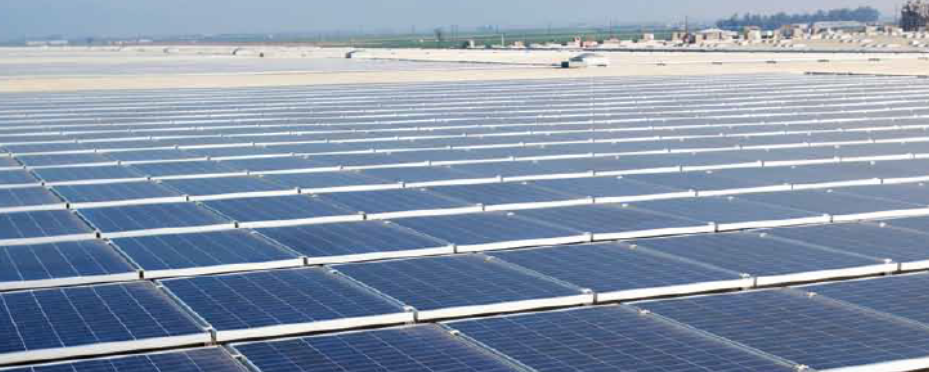 Solar panels in Hanford facility in California, USA
Solar panels in Hanford facility in California, USA![Climate Risk to Supply Chain[19644]](https://www.delmontepacific.com/hs-fs/hubfs/Climate%20Risk%20to%20Supply%20Chain%5B19644%5D.png?width=922&height=436&name=Climate%20Risk%20to%20Supply%20Chain%5B19644%5D.png)
Climate change is a business risk that impacts the Group’s operations, from altering the growing season to delaying shipments due to extreme weather and increasing costs for resilience measures. To reduce carbon emissions, we have undertaken initiatives to explore more efficient energy sources, strengthen energy conservation in worksites, and reduce process waste.
1. The Group takes a holistic approach to managing and mitigating risks posed by climate change by working across our value chain to measure climate impacts and implement adaptation initiatives.
2. About 90% of DMFI’s vegetables, fruits and tomatoes are grown in the United States. The Company mitigates greenhouse gas (GHG) emissions by locating processing plants near our growers, on average, less than 100 miles apart, resulting in lower fuel use and fresher products.
3. The Company installed a new refrigerant system in its Yakima facility that replaced chlorofluorocarbons and hydrochlorofluorocarbons with ammonia, an alternative system that does not use refrigerant gasses which have a global warming potential.
4. The system has resulted in electricity savings and lower operating costs.
5. In Hanford, the Company abides by the state’s cap and trade program, which require a year-on-year reduction in emissions. DMFI installed solar power in Hanford.
6. DMFI purchased a previously leased solar power generation installation in order to reduce our energy cost and emissions.
7. DMFI’s Modesto plant in California implemented multiple initiatives to minimize the impact of climate change. As part of continuous improvement efforts, the plant installed a combined heat and power system, selective catalytic reduction unit, condensing economizer, and backpressure turbine generator in the boiler system. These upgrades cut natural gas use by 20%. Lighting, compressed air, and other electric efficiency upgrades also reduced energy use by 12%.
8. In the U.S., the Company increased shipments by rail by over 2.3 million miles, an increase of 45%, which eliminated 8,086 MTCO2Eq or the equivalent of 133,703 seedlings grown for one year.
9. The Group started monitoring its carbon emissions for scopes 1, 2 and 3 with FY22 as its base year. Del Monte in the U.S. and in the Philippines included its upstream and downstream activities.
10. DMPI’s carbon sequestration through its vast 28,000-hectare plantation and around 665,000 trees planted to increase the forest cover around its plantation more than offsets DMPI’s carbon emissions.
11. Del Monte’s waste-to-energy facility converts the cannery’s wastewater into renewable energy. The facility generates 2.8 MW of electricity and cleanses water discharged at coastal waters of Macajalar Bay, which has Biochemical Oxygen Demand levels better than government mandated levels of 100 mg/liter.
The waste-to-energy facility produced about 19% of the cannery’s power requirement in FY23.
12. The Company has disaster recovery and business continuity plans to minimize the adverse effects of environmental incidents and initiatives to mitigate the effects of El Niño and La Niña.
13. Del Monte Philippines’ waste-to-energy facility ensures 100% wastewater treatment and serves as a shield against unstable power supply and power cost increases.
14. DMPI’s bottling plant and Manila office purchase their electricity from a Retail Electricity Supplier (RES) to save on costs. Part of the electricity purchased from RES comes from renewable sources.
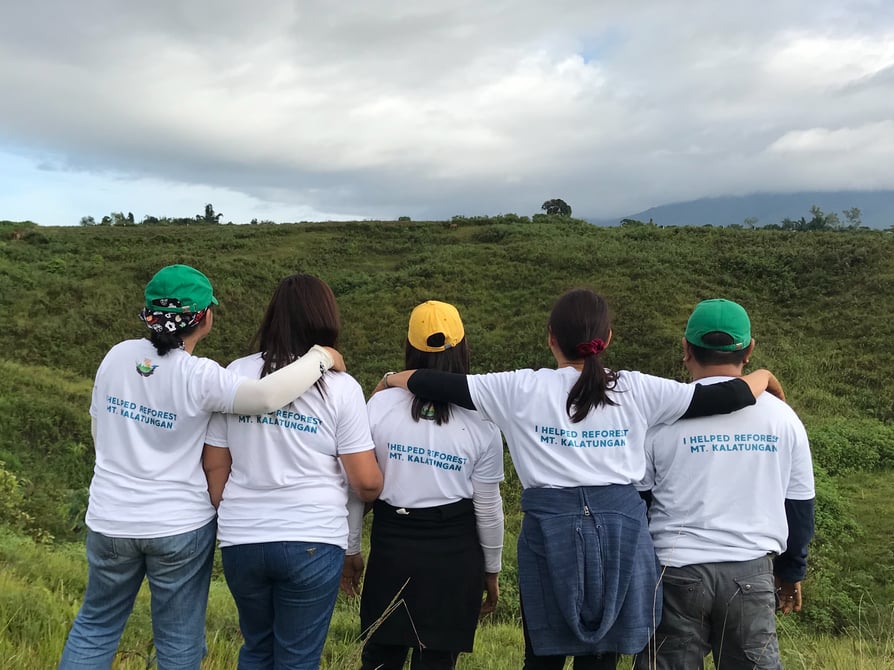
Solar panels in Hanford facility in California, USA
The Company has planted around 665,000 indigenous and commercial trees to date, including about 35,000 planted in FY23 in different areas of Bukidnon by the Del Monte Foundation, Plantation Operations, DEARBC cooperative, Xavier Science Foundation and Local Government Units for reforestation and soil conservation.
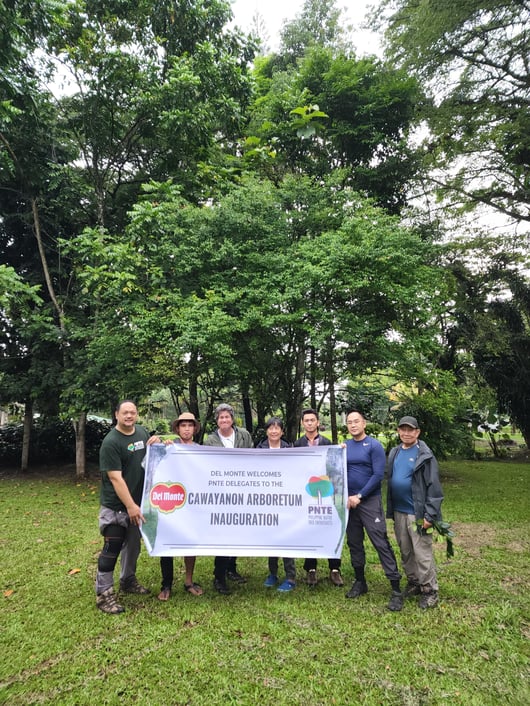
.png?width=595&height=446&name=MAMACILA%20tree%20nursery%20(1).png)
Contadina (only accessible in the Philippines)
Del Monte Careersc/o 17 Bukit Pasoh Road Singapore 089831 Tel: (65) 6324 6822 Fax: (65) 6221 9477